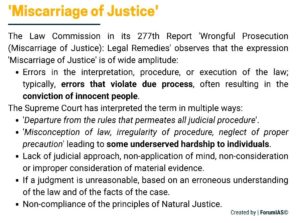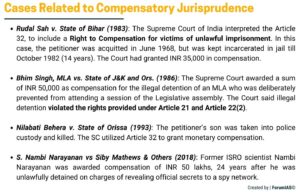ForumIAS announcing GS Foundation Program for UPSC CSE 2025-26 from 19 April. Click Here for more information.
Contents
- 1 Introduction
- 2 What are the statistics related to under-trials in prisons?
- 3 What remedies are available to a person against wrongful incarceration/conviction?
- 4 What are the global standards regarding Right to Compensation?
- 5 What is the need for Right to Compensation against wrongful arrest?
- 6 What should be the approach going ahead?
- 7 Conclusion
| For 7PM Editorial Archives click HERE → |
Introduction
It was noted by the English jurist William Blackstone that ‘It is better that ten guilty persons escape than that one innocent suffer‘. The principle has become a maxim in the modern jurisprudence. It highlights the importance of the protection of innocent people from wrongful legal actions. One of the major issue that troubles India’s legal framework is that of wrongful prosecutions, incarcerations, and convictions and the lack of a statutory Right to Compensation from the State to the victims in such cases. India has one of the highest number of under-trial prisoners in India. In 2020, India was ranked 15 out of 217 countries on the basis of its under-trial population as per the World Pre-trial/Remand Imprisonment List. This indicates the magnitude of the issue.
The data from the National Judicial Data Grid highlights that there are approximately 30.8 million criminal cases that are proceeding in the district courts of the country. Out of these, 8.05 million cases have been pending for more than 5 years. This implies that more than 25% criminal cases stay pending at the session’s court level for more than 5 years.
According to the latest data released by the NCRB (Prison Statistics India, 2020), out of India’s total of 4,88,511 prisoners (December 2020); 371,848 persons (76.1%) were under-trials (persons who have been committed to judicial custody pending investigation or trial by a competent authority).
The Law Commission in its 277th Report (Wrongful Prosecution (Miscarriage of Justice): Legal Remedies, 2018) has dealt with the issue of wrong prosecution in detail. The report observed that 25.1% of the total under-trials spent more than a year in prison (based on Prison Statistics India, 2015).
The above statistics only give an idea about the people wrongfully incarcerated during the trial stage. In addition, there are some people who are wrongfully convicted by lower courts but are subsequently acquitted by a higher court e.g., in February 2022, Allahabad High Court acquitted a murder convict 40 years after his conviction by a lower court. The data from National Judicial Data Grid shows that 26.55% of appeals against convictions have been pending before the High Courts for more than ten years.
Hence people who are wrongfully prosecuted, incarcerated, or convicted are made to suffer by the wrongful actions of the State. The State thus must have a legal obligation to compensate for the multiple social, economic, and legal suffering of the innocent people caused due to wrongful actions.
What remedies are available to a person against wrongful incarceration/conviction?
The legal framework in India does not have a law on the grant of compensation (Right to Compensation) to those maliciously prosecuted. However, Constitutional courts do exercise their powers sometimes to award monetary recompense.
The remedy of a civil suit is available in law, but it is time-consuming.
Section 358 of the CrPC (1973) provides for measly compensation of INR 100 to a person wrongfully arrested. The compensation is to be recovered from a person on whose complaint the victim was wrongly arrested. Award of this compensation is subject to the discretion of the Magistrate.
The Protection of Human Rights Act, 1993, empowers the National Human Rights Commission to inquire into instances of illegal detentions, wrongful convictions, incarcerations, and other human rights violations. After conducting an inquiry, NHRC can recommend that the State pay compensation and initiate proceedings against erring officials.
The Law Commission in its 277th Report (2018), noted that ‘the currently available remedies only create an ex-gratia obligation, and not a statutory obligation on the State to compensate‘. Thus, at present, the provision of compensation is subject to the discretion of the Judiciary (or NHRC), rather than a legal obligation of the Executive.
What are the global standards regarding Right to Compensation?
The Right to Compensation for wrongful prosecution, incarceration, and convictions has been recognized by various international covenants. It has been enforced by various enactments, statutes, and acts in jurisdictions all over the globe.
The International Covenant on Civil and Political Rights (1966) lays down the basic commitments that State parties need to adhere to protect the civil and political liberties of the individual. The Right to Compensation for Wrongful Convictions is laid down in Article 14(6) of the Covenant.
Article 5(5) of the European Convention for the Protection of Human Rights and Fundamental Freedoms also talks about Compensation for wrongful arrest.
What is the need for Right to Compensation against wrongful arrest?
First, a person experiences extreme physical and mental discomfort while being imprisoned. It undermines Article 21 of the Constitution i.e Right to a dignified life. This discomfort is exacerbated by the slow disposal rate of the judicial system. A wrongful arrest also violates Article 22 (protection against arbitrary arrests and illegal detention etc).
Second, wrongful imprisonment can have a deep psychological impact on the victim. A study undertaken at the University of Cleveland (US) showed that long incarceration in jail leads to feeling of loss of freedom, loss of identity and dignity and a feeling of rage and anxiety. These effects eventually cause development of Post-traumatic Stress Disorder (PTSD), depression and paranoia. The consequences impact the ability of the victim to lead a normal life even after absolution.
Third, the incarcerated person suffers from damage to health, loss of income or earnings, loss of property due to costs of legal fees, and other consequential expenses resulting from the wrongful prosecution. There is loss of family life and loss of opportunities (like education, future earning abilities).
Fourth, a person and his family face social boycott and harm to reputation in society owing to the stigma attached with imprisonment. Acquittal at a later stage doesn’t completely restore the lost prestige.
Fifth, a Right to Compensation will help in reducing the quantum of malicious prosecution by the State authorities. For instance, many people are wrongfully booked under Section 66A of the IT Act that has been declared unconstitutional by the Supreme Court.
Although the State cannot return the lost years, family life, opportunities, etc to the victim, it still can help the victim to reintegrate back into the society by providing pecuniary and non-pecuniary assistance for the same.
What should be the approach going ahead?
First, the Parliament must enact a law based on the various recommendations of the Law Commission (277th Report). The law should create a uniform compensatory framework. The report recommends the creation of a statute laying down the conditions, amounts, procedure, etc of awarding compensation to innocents. The main highlights of the recommendations include: (a) The creation of a special court in each district for claims. This would ensure speedy and efficient disposal of cases; (b) The report also highlighted that the compensation under the statutory framework would include both pecuniary and non-pecuniary compensation; (c) A specific provision for removing disqualifications attached to a prosecution or conviction is also imperative to dispel the social stigma that is attached to the victim because of the criminal proceedings.
Second, a proactive role needs to be played by the non-governmental organizations to help the victims of such wrongful acts approach the appropriate courts and claim their respective rights.
Third, the statutory framework as enacted by the Parliament must also have provisions for providing non-pecuniary awards to the immediate families of victims of wrongful prosecutions, incarcerations and convictions.
Fourth, there should be an enhanced focus on training of law enforcement officials to reduce the cases of wrongful arrests. Apart from this, prosecutors and judiciary can also play a positive role in reducing the quantum and duration of wrongful arrests.
Fifth, appropriate steps are required to reform the criminal justice system, reduce the pendency of cases and undertake judicial reforms. Pendency of cases is increasingly consistently every year, and yet there has been little action by the Judiciary, Legislature and Executive.
Conclusion
The Indian legal system is overburdened with an excessive number of criminal cases; and in such a scenario it becomes all-the-more necessary for the State that it protects the rights of innocents. In this regard, a statutory framework for providing compensation to the victim and his/her family is an urgent need of the Indian legal system.
Source: The Hindu, The Leaflet, IJLMH






